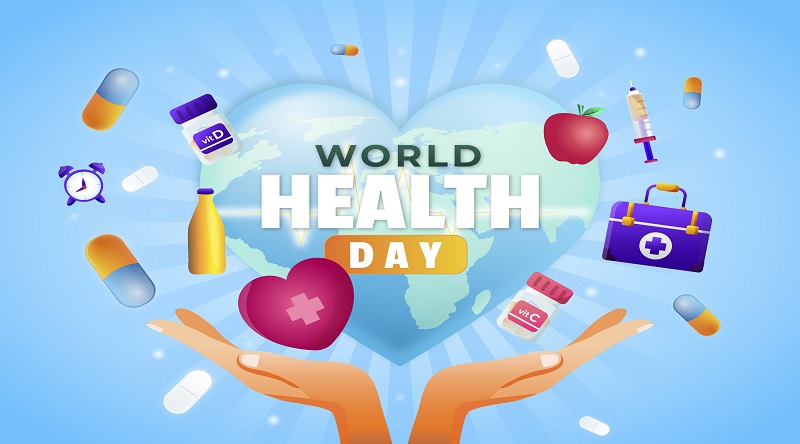World Health Day is celebrated on April 7th each year to raise awareness about global health issues and encourage people to take action to improve their health and well-being. This year’s theme is “Building a Fairer, Healthier World,” highlighting the need for greater equity in access to healthcare services and addressing the social determinants of health.
Here are some key points to consider on this World Health Day:
- Health equity: Health equity means that everyone has a fair and equal opportunity to live a healthy life, regardless of their race, ethnicity, gender, socioeconomic status, or geographic location. Unfortunately, many people around the world do not have access to basic healthcare services and suffer from preventable illnesses and diseases. To build a fairer, healthier world, we need to prioritize policies and initiatives that address social and economic inequalities, promote health literacy, and ensure access to healthcare services and vaccines.
- Addressing discrimination and bias: Discrimination and bias in healthcare settings can lead to poor health outcomes and prevent people from seeking necessary medical care. It is important to recognize and address biases in healthcare delivery, and to work towards creating a healthcare system that is free from discrimination and bias.
- Protecting the environment: Environmental factors such as air pollution, water contamination, and climate change have a significant impact on global health. To build a fairer, healthier world, we need to work towards creating a sustainable environment that supports healthy living.
- Investing in medical research: Medical research is essential for developing new treatments and cures for diseases, and for improving our understanding of health and disease. Governments, private organizations, and individuals should invest in medical research to drive progress in global health.
- Access to healthcare services: Access to healthcare services is a fundamental human right. However, many people around the world do not have access to basic healthcare services due to poverty, lack of infrastructure, or discrimination. To build a fairer, healthier world, we need to invest in healthcare infrastructure and education, and promote collaboration and information sharing between countries.
- Personal responsibility: As individuals, we also have a responsibility to take care of our own health and well-being. This includes exercising regularly, eating a balanced diet, getting enough sleep, managing stress, and avoiding harmful habits like smoking and excessive alcohol consumption.
One of the key components of building a fairer, healthier world is addressing social and economic inequalities. These inequalities can have a significant impact on an individual’s health outcomes. For example, people living in poverty may not have access to healthy food options or safe housing, which can lead to an increased risk of chronic diseases. To address these inequalities, we need to prioritize policies that support economic and social justice, such as increasing the minimum wage, expanding access to education and job training, and providing affordable housing.
Another critical aspect of building a fairer, healthier world is promoting health literacy. Health literacy refers to an individual’s ability to understand and use health information to make informed decisions about their health. Low health literacy is a significant barrier to achieving health equity, as it can limit an individual’s ability to access healthcare services, understand medical instructions, and make informed decisions about their health. To promote health literacy, we need to invest in education and awareness campaigns that help individuals understand how to make healthy choices and access healthcare services.
Addressing discrimination and bias is also essential in building a fairer, healthier world. Discrimination and bias can have a significant impact on an individual’s physical and mental health, leading to increased levels of stress and reduced access to healthcare services. To address discrimination and bias, we need to promote diversity, equity, and inclusion in all aspects of society, including healthcare systems, workplaces, and schools.
Environmental factors also play a significant role in shaping an individual’s health outcomes. Air pollution, access to safe water, and exposure to toxic chemicals can all impact an individual’s health. To build a fairer, healthier world, we need to prioritize policies that promote clean air and water, reduce exposure to toxic chemicals, and address the impacts of climate change.
The COVID-19 pandemic has highlighted the need for equitable distribution of vaccines and healthcare resources. To build a fairer, healthier world, we need to ensure that all individuals have access to COVID-19 vaccines and healthcare services, regardless of their socio-economic status or country of origin. This requires a global effort to address vaccine distribution and healthcare infrastructure, as well as addressing the root causes of vaccine hesitancy and misinformation.
We also need to ensure that healthcare is affordable and accessible to all individuals. Many people around the world do not have access to basic healthcare services because they cannot afford it. This can lead to preventable deaths and illnesses. Governments need to ensure that healthcare services are affordable and accessible to all individuals, regardless of their financial status. This can be done through implementing universal healthcare systems, expanding health insurance coverage, and providing subsidies for healthcare services.
Another critical aspect of building a fairer, healthier world is investing in research and development of new treatments and technologies. Medical research has led to many life-saving treatments and technologies, but these are often expensive and not accessible to everyone. By investing in medical research, we can develop new treatments and technologies that are more affordable and accessible to all individuals. This can help to reduce health disparities and improve health outcomes for everyone.
In conclusion, World Health Day is an opportunity to reflect on the importance of global health and the need to build a fairer, healthier world. Addressing health inequities requires a multi-faceted approach that involves addressing social and economic inequalities, reducing discrimination and bias in healthcare settings, protecting the environment, investing in medical research, increasing access to healthcare services, and promoting personal responsibility for health and well-being. By working together, we can create a world where everyone has access to the healthcare services and resources they need to live healthy and fulfilling lives.



